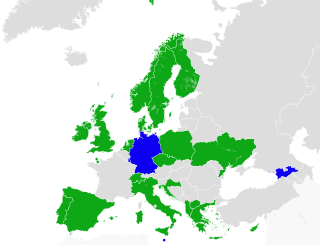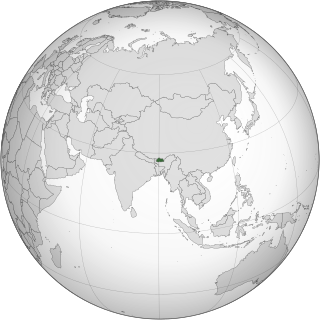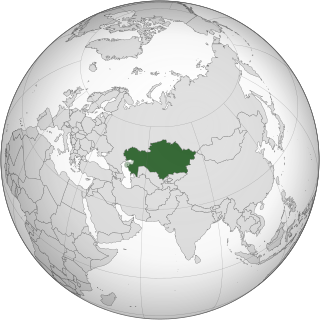 Location of the Maldives (dark green) | |
| Medicinal | Illegal |
|---|---|
| Recreational | Illegal |
 Location of the Maldives (dark green) | |
| Medicinal | Illegal |
|---|---|
| Recreational | Illegal |
As per the United Nations Economic and Social Commission for Asia and the Pacific, drug availability was first recorded in the 1970s in the Maldives. Cannabis usage was noted among tourists, who may have introduced it to the country. [1]
The Yearbook of the United Nations 2003 noted that cannabis was illicitly cultivated in every country of South Asia, with the exception of the Maldives. [2]

The United Nations Economic and Social Commission for Asia and the Pacific (ESCAP) is one of the five regional commissions under the jurisdiction of the United Nations Economic and Social Council. It was established in order to increase economic activity in Asia and the Far East, as well as to foster economic relations between the region and other areas of the world.
The International Narcotics Control Board (INCB) is an independent treaty body, one of the four treaty-mandated bodies under international drug control law.

The Commission on Narcotic Drugs (CND) is one of the functional commissions of the United Nations' Economic and Social Council (ECOSOC), and is the central drug policy-making body within the United Nations System. The CND also has important mandates under the three international drug control conventions, alongside the three other treaty-mandated bodies: United Nations Office on Drugs and Crime, World Health Organization, and International Narcotics Control Board.

Crime in the Maldives ranks from low to moderate, but crime rates in the country have increased significantly in recent years. Incidents of theft on beaches or in hotels do occur. Juvenile delinquency is a growing problem in the Maldives. According to the data available from the Ministry of Defence and National Security, there has been an increase in petty crime in the country. In 1992, 169 cases of petty crime were reported, while the number was 462 in 1996. The number of sentenced persons under the age of 19 also increased from 391 in 1988 to 512 in 1998. Fraud examiner Peter Lilley in his book Dirty Dealing writes that money laundering is not a significant problem in the Maldives.

Cannabis is illegal in Afghanistan. It has been cultivated for centuries, and experienced relatively little interference until the 1970s, where after it became an issue both in international politics and in the finance of the series of wars which occurred in Afghanistan for forty years. In 2010, the United Nations reported that Afghanistan was the world's top cannabis producer.

Cannabis in Palau is illegal, but reports indicate the drug is widely produced and consumed on the island nation. Palau is a former Trust Territory of the Pacific Islands of the United States which gained independence in 1994, and has a population under 20,000.

Cannabis in Papua New Guinea is illegal, but the nation is a significant producer and consumer of cannabis. Cannabis is sometimes called spak brus in local parlance.

Cannabis in Chile is illegal for all production and public consumption, though private at-home consumption, grow and selling is allowed for medical use. It is widely consumed, with the highest per-capita use in Latin America. In 2014 Chile began clinical trials on medical marijuana, and in 2015 a decriminalization bill successfully passed the lower house of the Chilean Congress.

Cannabis is illegal in Nigeria, yet the country is a major source of West African-grown cannabis, and ranked the world's third highest consumer of cannabis.

Cannabis is legal for medical and industrial purposes in Albania.

Cannabis in Bhutan is illegal, but grows prolifically in the country and has multiple traditional uses, such as feeding pigs and producing textiles.
Cannabis is illegal in Benin. The country is not a major drug producer or consumer, but increasingly serves as a transshipment point for drugs produced elsewhere. Cannabis is the only drug produced locally in Benin, though mostly on a small scale.
Cannabis in Lesotho is a traditional crop that remains illegal for any use, but largely tolerated. The plant is known as matekoane in Sesotho language but also called khomo ea fatše, likata or kakana.
Cannabis in Grenada is illegal. Cannabis possession is the most common drug offense on the island, and the annual prevalence of cannabis use amongst adults was reported as 10.8% in 2005.
Cannabis in New Caledonia is illegal, but is cultivated illicitly. Sources note that "hard drugs" are rare in New Caledonia, and their drug issues are primarily confined to cannabis, with local Kanak chiefs being anti-drug and working to eradicate cannabis plantations.

Cannabis in Yemen is illegal. Cannabis is less common in Yemen than khat.
Cannabis in Senegal is illegal; the drug is locally referred to as yamba.

Consuming and possession of cannabis in Kazakhstan is illegal.
Cannabis is illegal in Angola. The drug is locally referred to as diamba or liamba.
The removal of cannabis and cannabis resin from Schedule IV of the Single Convention on narcotic drugs, 1961 is a change in international law that took place from 2019 to 2021, on the basis of a scientific assessment by the World Health Organization.